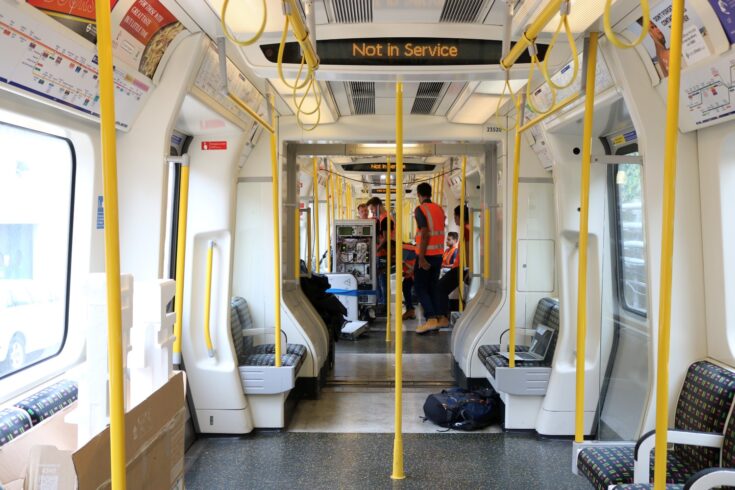The funding includes:
- £8 million to fund 12 projects exploring quantum technologies for position, navigation and timing (PNT)
- £6 million for 11 projects working on software enabled quantum computation
- £6 million for 19 projects’ feasibility studies in quantum computing applications
- £25 million for seven projects quantum-enabled PNT via the Small Business Research Initiative (SBRI)
Talking at an event during this year’s London Tech Week, UK Science Minister, George Freeman, today announced new funding to support universities and businesses working in the UK’s quantum technologies sector.
These new investments, through the UK Research and Innovation (UKRI) Technology Missions Fund, will build upon the country’s National Quantum Technologies Programme which has been running for nearly a decade.
Harnessing quantum physics
One of the 12 projects researching PNT announced today is led by Dr Joseph Cotter from Imperial College London. It aims to harness quantum physics to develop a new type of sensor technology that can be used underwater or underground.
It will explore how quantum sensors can complement the use of the global navigation satellite systems (GNSS) that much of society currently relies upon.
GNSS enables real-time access to the location of items for delivery and supports the transportation of goods and services including maritime and road transit. However, it can be vulnerable to adverse weather conditions, jamming and has limited capability underwater and underground.
The Imperial team are developing new navigation sensor technology that will provide superior position accuracy in the networks beneath our feet and a more resilient and secure alternative to GNSS.
Partnering with Transport for London (TfL), the team will test the new technology on trains. With 45% of TfL’s network underground.
This group of projects has also been supported by £400,000 from the Defence Science and Technology Laboratory.
Quantum compilers
Delivered in partnership with the National Quantum Computing Centre (NQCC), the 11 software-enabled quantum computation projects will advance algorithm capability to improve the performance of quantum computers.
One project, led by Dr Aleks Kissinger at the University of Oxford, will develop the next generation of quantum compilers.
Quantum compliers are tools that translate code written by humans into something the machine can run, increasing the ability to understand and tame many sources of errors. This produces efficient software with independently-checkable guarantees of reliable performance.
Feasibility studies in quantum computing
The 19 feasibility studies in quantum computing applications will demonstrate commercial benefits of quantum computing to:
- investigate the use of quantum computing and quantum machine learning to reduce carbon emissions in aviation
- develop improved methods for detecting and reducing money laundering
- apply and commercially exploit quantum computing techniques to address operational healthcare use cases (for example, theatre list patient allocation, urgent care patient triage, community nurse visit schedules)
- create a next-generation quantum computing based approach to enzyme targeted drug discovery
Supported through UKRI’s SBRI, seven projects will deliver quantum-enabled systems for positioning, navigation and timing.
The aim is to deliver quantum-enabled sensors for navigation applications, such as magnetic or gravity field sensors. Projects include:
- UK sovereign supplies of deployable high accuracy atomic clocks to provide timing and navigation in the absence of satellite navigation signals
- industrial applications such as finance transaction stamping and future (5G, 6+G) telecommunications
Harnessing the benefits of quantum
Minister of State at the new Department for Science, Innovation and Technology George Freeman MP said:
We are on the cusp of a quantum technology revolution, set to deliver transformational increases in computer processing speed and power in a whole new field of capabilities in sensing, communications, encryption, cyber security and navigation.
As a result of our £1 billion investment in research and development over the last 10 years, the UK’s cluster of world-class researchers, engineers, innovators and businesses are now developing the QBIT hardware, middleware, tools and applications to harness the benefits of quantum for our economy and society.
That is why we have set out our next 10 year National Quantum Strategy, backed by £2.5 billion, around developing the National Quantum Computing Centre and Hubs, skills, and some targeted Quantum missions to catalyse supply chain partnerships to demonstrate specific and tangible cutting-edge quantum technology applications in fields like healthcare, satellite communications, cybersecurity and Fintech where the UK is already a world leader.
This London Tech Week AI rightly has the headlines – but Quantum is coming. We are making sure the UK is ready to harness it for the benefit of all.
The cutting edge
Will Drury, Executive Director, Digital and Technologies at Innovate UK said:
Our exceptional researchers, businesses and innovators are continuously pushing the boundaries of Quantum Technology development, placing the UK at the leading edge of this field.
Together, through this support and investment, we will work in partnership to realise the potential of this technology for our UK economy and society.
Developing quantum computing testbeds
It is also worth noting that as part of a wider quantum computing mission, the NQCC is also investing £30 million to commission the development of quantum computing testbeds (prototype quantum computers) in the UK.
The mission seeks to underpin further growth of a UK quantum computing sector capable of delivering quantum advantage in 2025.
The NQCC is partnering with Innovate UK to deliver the competition. This opportunity is currently open for expression of interest but closes on 26 June 2023.
Further information
For media enquiries please email press@ukri.org or call 01793 298 902

